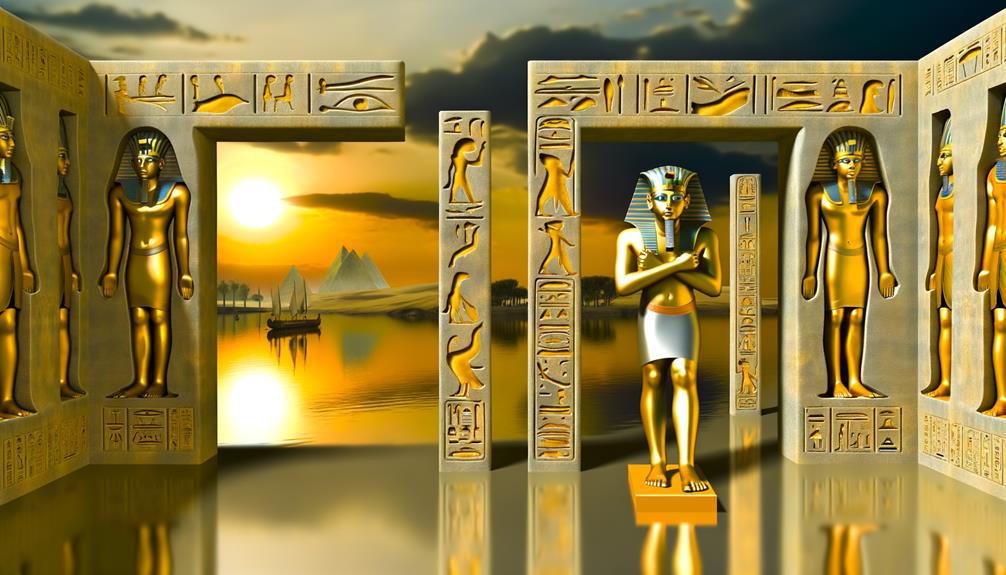Meaning of the Name Ramses
The name Ramses, originating from the ancient Egyptian language, signifies 'Ra is born' or 'Born of Ra,' reflecting the pharaohs' divine association with the sun god, Ra. This connection underscores the cultural importance of theology and governance in ancient Egypt, emphasizing the pharaohs' role in maintaining divine order.
Historically linked to notable rulers like Ramses II, the name represents both military prowess and monumental architectural achievements. Ramses' legacy permeates Egyptian mythology, where pharaohs are depicted as earthly representatives of gods.
For a deeper understanding of Ramses' impact on culture, art, and modern portrayals, additional context is valuable.

Key Takeaways
- Ramses means "born of Ra," linking the name to the ancient Egyptian sun god.
- The name signifies divine lineage and dynastic continuity in ancient Egypt.
- Ramses reflects the pharaoh's role in sustaining cosmic order (ma'at).
- The name integrates ancient Egyptian theology and governance.
- Ramses evokes historical legacy and grandeur, especially in cultural monuments and achievements.
Etymology of Ramses
The name 'Ramses' originates from the ancient Egyptian language, specifically from the combination of the words 'Ra,' referring to the sun god, and 'meses,' meaning 'born of' or 'son of.' This etymology reflects the deep-seated religious and cultural values of ancient Egypt, where the pharaoh was often regarded as a divine or semi-divine figure.
The invocation of 'Ra' in the name underscores the pharaoh's supposed connection to the divine, enhancing his legitimacy and authority. Moreover, the structure of the name itself signifies a lineage or descent, indicating the importance of dynastic continuity.
The linguistic components highlight the integration of theology and governance in Egyptian society, providing a nuanced understanding of how names were crafted to convey power and divinity.
Historical Significance
Examining the historical significance of the name Ramses reveals its association with some of ancient Egypt's most influential pharaohs, who left an indelible mark on the civilization's cultural, political, and architectural legacy.
Noteworthily, Ramses II, also known as Ramses the Great, is celebrated for his extensive contributions. The name Ramses is synonymous with:
- Military Achievements: Ramses II led successful campaigns, particularly the Battle of Kadesh.
- Architectural Marvels: Constructions like the temples of Abu Simbel and the Ramesseum.
- Diplomatic Endeavors: The first recorded peace treaty with the Hittites.
- Economic Prosperity: Enhanced trade routes and economic activities during his reign.
Through these accomplishments, the name Ramses encapsulates a rich legacy of leadership and innovation in ancient Egypt.
Ramses in Egyptian Mythology
Ramses' divine associations in Egyptian mythology underscore the pharaohs' perceived connection to the gods and their role in upholding ma'at, the cosmic order.
The name Ramses, meaning 'Ra is the one who bore him,' highlights the direct link between the pharaoh and Ra, the sun god. This divine lineage was vital for legitimizing the pharaoh's rule, presenting him as a living deity tasked with maintaining balance and harmony in the universe.
Various inscriptions and temple reliefs depict Ramses II engaging with gods such as Amun and Ptah, reinforcing his divine favor and authority.
Through these depictions, Ramses' role transcended mere kingship, embodying the sacred duty to sustain ma'at, ensuring stability and prosperity for the empire.
Cultural Impact
Beyond his divine associations, Ramses II's influence permeated various cultural spheres, leaving an indelible mark on art, architecture, and historical legacy. His reign, often seen as a pinnacle of Egyptian civilization, is encapsulated through numerous cultural artifacts that continue to captivate scholars and enthusiasts.
Key areas of his cultural impact include:
- Monumental Architecture: The construction of the temples at Abu Simbel and the Ramesseum exemplify his architectural legacy.
- Artistic Innovation: Frescoes and statues from his era exhibit advancements in stylistic techniques and symbolic representation.
- Literary Contributions: Inscriptions and hieroglyphics from his time provide critical insights into ancient Egyptian language and thought.
- Political Propaganda: His military campaigns and treaties were immortalized in stone, reinforcing his image as a powerful and benevolent ruler.
These elements collectively underscore Ramses II's enduring cultural significance.
Modern Usage and Legacy
In contemporary contexts, the name Ramses continues to evoke notions of power, grandeur, and historical significance, reflecting its enduring legacy through various modern adaptations and references.
This name appears frequently in popular culture, from literature and films to video games, often symbolizing leadership and ancient wisdom. The continued fascination with ancient Egypt has propelled the name into mainstream awareness, where it is used to denote products, characters, and even institutions that aim to convey an aura of authority and timelessness.
Additionally, the name Ramses is sometimes adopted in academic and educational settings, serving as a bridge to the rich historical heritage associated with the ancient Egyptian pharaohs. This highlights the name's persistent resonance and multifaceted application in modern society.
Conclusion
The name Ramses, steeped in etymological roots and historical gravitas, reverberates through the annals of Egyptian mythology and cultural history. Its invocation conjures images of monumental pharaohs and divine lineage, echoing the illustrious reigns chronicled on ancient temple walls.
The legacy of Ramses extends beyond antiquity, permeating modern nomenclature and cultural references. Much like the enduring pyramids, the name Ramses stands as a tribute to the timeless interplay between history and identity, bridging past and present.






